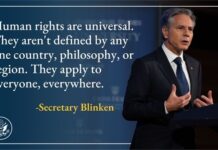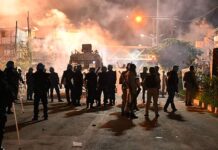When floods inundate settlements, when cyclones and tidal surges wreak havoc, and when nor’westers raze everything to the ground, there is still hope of a new start. Everything gradually falls back into place. New houses and new flowers lend a new lease of life. But when the intellect and the moral backbone of a nation is destroyed, there is no guarantee that this will be revived even in a hundred years. Such a nation may have a national flag, a national anthem, a national symbol, but it loses its independent identity and dignity.
The people of Bangladesh had defeated a brutal armed force and driven them from the land. We had very little arms and ammunition compared to that army. But we were on the track of justice and truth. Our reasoning was our greatest weapon. Justice and reasoning won that war of resistance. But today we are being defeated by ourselves. Self-defeat is an overwhelming defeat.
A nation grows though trial and error. The people have been taken aback by responses of the ruling party and the opposition after the judgement on the 16th amendment to the constitution was passed. Anyone has the right to express their opinion about the observations made on the judgement, but it is quite another matter to express glee or agitation over the issue. On one hand the ruling party has been expressing its anger and dissatisfaction, while on the other hand the opposition has been elated. The ruling party’s anger is understandable to an extent, but the opposition’s happiness is not quite comprehendible.
Had the state been normal today, then the full judgement could have been read thoroughly and if there was any objection of difference of opinion, that could have been duly submitted in writing to the Supreme Court. A review petition could also have been filed. Did the critics consider how prudent it was to confuse the people with their outburst against the judgement of the chief justice and seven judges of the Supreme Court? As for the opposition, they hardly even thought twice about how ridiculous and inane their reaction was. They do not have the time to read such a lengthy report and so they can easily say, “good judgement”, without even perusing it.
Bangladesh still has a constitutional structure. When the constitution begins with the words, ‘we, the people of Bangladesh’, it defines that Bangladesh is a people’s republic. It is an independent and sovereign republic. There can be no debate over this.
Like other republics of the word, Bangladesh has three organs of state – the executive, the legislature and the judiciary. If one is dropped, the other two are incomplete. No one organ is bigger or smaller than the other. But the executive has the most work. That is why the prime minister is the highest executive of the state.
We often hear the sentence, “the parliament is sovereign”. But the people have often seen that there was no parliament at all in the country. From 1975 to 1979 there was no parliament in Bangladesh. But the government carried out development work, the police, the court, the offices were all functional. But the military rule was in charge of the executive.
The head of the parliament is the speaker, and the chief justice is the head of the judiciary. The Appellate Division and the High Court comprise the Supreme Court. The chief justice is an institution. There can be no contempt against the prime minster, the speaker and the chief justice. It is a serious offence to insult or abuse them publicly. That amounts to insulting the office. But everyone has the right to a difference of opinion.
The state runs in accordance to the constitution. But the country and the society runs along unwritten norms and ethics. Perhaps there is no constitution in the world that says you must respect others and if you do not do that, then you will be sentenced to prison. Respect towards another and speaking respectfully of another, is something that applies to the citizen of any country, whether independent, dependent or a vassal state.
No person in constitutional office is above criticism. But the criticism cannot be in objectionable language. It is both foolish and racist to raise the issue of the criticised person’s religion, colour or caste. Racism is a crime in today’s world. Any discussion on state matters must be based on issues, not be an attack on an individual. No person’s intelligence or knowledge is outwardly displayed. There is no yardstick to measure this and so this shouldn’t be questioned in public.
It is because Awami League, under the leadership of prime minister Sheikh Hasina, is in government, that the offices, courts, educational institutions and all places are overflowing with Bangabandhu lovers. There are very few people who will be able to provide accurate information on who did what to remember Bangabandhu after 1975 and to bring his two daughters back to the country.
Fair weather friends are nothing new in Bangladesh. There are very few people who come forward in tough times. Whether anyone acknowledges Bangabandhu’s contribution or not, his greatness remains undiminished. Even today there are innumerable people who love him in all sincerity. I know of so many people who sacrificed animals in his name after his death, and they did so with no ulterior motive of gain.
Today there are hundreds and thousands of posters and banners all over the place with persons putting up their own pictures along with that of the the prime minister. During the last caretaker government, there was not a single human chain protesting against her internment. There are those who stay by one’s side in dark days, and there are those who sprout slogans when one is in power. It is difficult to determine the true friends of those in power. The person who is lending support today, will change colours overnight if his or her interests are harmed.
The agitation and the tirade that has followed the judgement on the 16th amendment, has been most unfortunate. This can be damaging to the nation. All organs of the state are expected to cooperate. If the respect of any organ is harmed, the state is weakened. If the state is weak, outside forces and evil forces within, gain in strength. Our controlled behaviour is a blow to the state. What can we say then, if outside forces tell us we are not competent enough to run our country?
Those of us who are creating a ruckus over our own self-interests, will be washed away like a straw in the tide of time. But who will clean up the pile of garbage we leave behind? A few generations ahead, the people will say, what sort of of people lived in the country at that time! They had no respect for each other, not manners and no cordiality!
There is dire need for clean politics. Difference of opinion and divisions are not the same thing. Differences of opinion do not damage national unity. There will certainly be differences of opinion in a democratic republic. That is the beauty of democracy.
Source: Prothom Alo










Prothom Alo is a great supporter of AL government. They print stories to show people how much they dislike AL. It is not true. Everyone should understand, there is a drama going on in Bangladesh. AL/Sheikh Hasina with Indian help has amassed a lot of strategical knowledge. One of them is; how to manipulate the news and twist everything so it can hold on to power. People should understand, please do not buy into Prothom Alo or even Surendra Kumar Sinha’s twisting remarks. He should not be trusted.